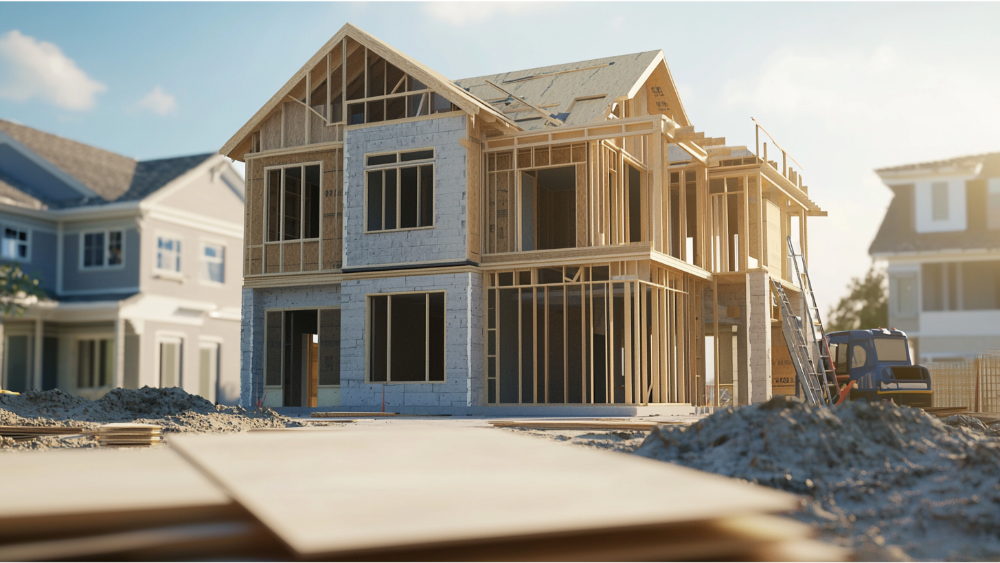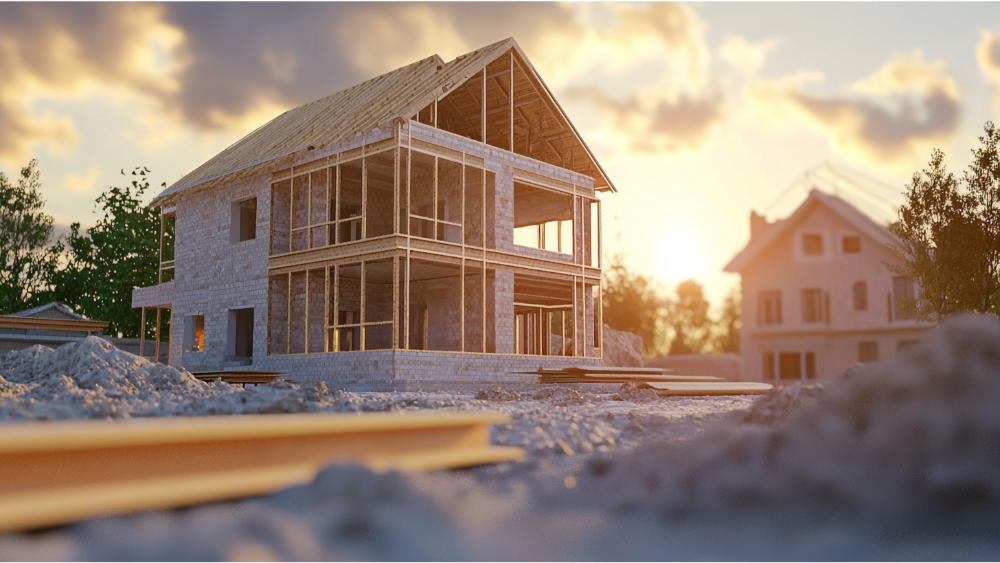
Building a Custom Home Checklist? Try This!
Building a custom home is an exciting and rewarding experience. It gives you the opportunity to create your dream house exactly the way you want it. Plus, you can tailor every detail to reflect your unique style and needs.
Building a custom home can be daunting and stressful without proper planning. To ensure a smooth process, it's crucial to have a checklist of considerations before and during the construction of your custom home building process.
Pre-Construction Checklist

Before breaking ground on your new home, there are several important factors to consider. Taking the time to thoroughly plan and prepare can ensure a smoother building process and a successful outcome.
Budget
Your budget will play a crucial role in determining the type of house you can build, including its size, style, and location. It will also affect the number and quality of upgrades you can afford, such as high-end finishes, energy-efficient appliances, and landscaping.
To ensure a smooth home-building project, plan your budget thoroughly, considering not only the standard costs associated with construction but also leaving a buffer for unexpected expenses like permit fees, material price fluctuations, or changes in design. By accounting for these factors, you can create a home that meets your needs without financial stress.
Loan Approval
Unless you have the entire budget saved up, getting construction loans is an essential step in building your custom home. Before starting the process, it's recommended to get pre-approved for a construction loan from a reputable lender.
Pre-approval allows you to know how much the bank is willing to lend you and at what interest rate. This information can help you set realistic expectations and determine whether any adjustments need to be made to your budget.
Location and Lot Selection
The location of your home is vital and can greatly affect your quality of life. When selecting a neighborhood, think about factors like the quality of school districts, as they can shape your children's education and future prospects. You can explore options independently or with the help of a real estate agent. Additionally, nearby amenities such as grocery stores, parks, gyms, and restaurants are essential for convenience and overall lifestyle.
Additionally, the overall community atmosphere, including safety, friendliness of neighbors, and community activities, is important for fostering a sense of belonging. Don't forget to check for any zoning restrictions or building codes in the area, as these can affect your property use, future renovations, and overall investment potential. Researching these factors thoroughly will help ensure you make a well-informed decision.
Purchase Land

Once you have narrowed down your desired location, it's time to purchase the land where you will build your home. The process of purchasing land can be overwhelming, so it's best to work with a reputable real estate agent who specializes in land transactions. They can help you navigate any potential issues or challenges and ensure that all legal aspects are properly addressed.
Architectural style
Choose an architectural style that reflects your personal taste, whether it's modern, traditional, or something in between. Consider elements like color, materials, and design features that harmonize with the surrounding homes in your neighborhood.
Pay attention to the architectural details, such as rooflines, window styles, and landscaping, to ensure your choice enhances the overall aesthetic of the area while also making a statement about your unique style.
Hiring a builder
Conduct thorough research and meet with multiple builders before making your final decision. Look for home builders who specialize in custom homes and have a solid track record of successful projects. Ask for references from previous clients to gauge their satisfaction and the quality of the work. Consider visiting some of the builders' completed homes to see their craftsmanship firsthand.
It's also beneficial to discuss your specific vision and requirements to ensure they can bring your dream home to life. Don't hesitate to ask questions about their building process, timelines, and communication practices to find the best fit for your project.
During Construction Checklist

Once construction begins, there are certain things to keep track of to ensure everything is going according to plan. Regular inspections and progress updates are essential to address any issues promptly.
Regular site visits
During each visit, take note of any potential issues, such as delays or quality concerns, and address them promptly to avoid larger problems down the line. Additionally, communicate frequently with the project manager and the construction team to stay informed about any changes to the plan or schedule that may arise. This proactive approach will help ensure the project stays on budget and meets its deadlines.
Materials and finishes
Stay on top of the materials and finishes being used in your home to make sure they match what was agreed upon with the builder. Keep track of any changes or upgrades made. Between light fixtures, flooring, paint colors, and other finishing touches, it's easy to overlook details that may be important to you. Communicating regularly with the builder will help avoid any misunderstandings and ensure that your vision and personal style is being executed correctly.
Inspection checklist
As construction progresses, there will be several inspections required by local building codes. Ensure that these are scheduled and completed on time to avoid potential delays. Additionally, create a personal inspection checklist to track critical elements of your home, such as plumbing, electrical wiring, HVAC systems, and insulation. This can help identify any issues early on and ensure they are addressed before the completion of the project.
Communication
Effective communication with your builder is crucial for a successful custom home build. From the initial design phase to the final touches, it's essential to maintain an open line of communication throughout the entire process. Be proactive in discussing any changes, questions, or concerns you may have, and ensure that you convey your ideas promptly and clearly.
Regular check-ins and updates can help prevent misunderstandings and ensure that your vision is accurately realized. Remember, a collaborative relationship with your building team can lead to a smoother construction experience and a home that truly reflects your desires.
Final Checklist

As construction nears completion, it's important to double-check everything before moving into your new home. Taking the time to inspect details ensures a smooth transition and peace of mind in your new space.
Inspection
Before closing on your new home, hire a qualified professional inspector to conduct a comprehensive examination of every aspect, including the foundation, plumbing, electrical systems, and roofing.
This thorough inspection will help uncover any potential issues, such as structural concerns, code violations, or necessary repairs, that should be addressed by the builder. Ensuring your new home is in top condition will provide peace of mind and protect your investment.
Finishing touches
Schedule a final walk-through with the builder to thoroughly inspect the property, ensuring that all finishes and details meet your expectations. This includes checking the quality of materials, verifying that all fixtures are installed correctly, and confirming that any agreed-upon changes have been made.
Take notes, ask questions, and don't hesitate to point out any concerns to ensure everything is completed to your satisfaction before finalizing the project.
Move-in preparations
Plan ahead for moving into your new home by scheduling movers well in advance to secure your preferred date and time. Create a detailed checklist of tasks, including setting up utilities like electricity, water, and internet services to ensure everything is ready upon arrival.
Don’t forget to transfer or cancel any necessary services or subscriptions, such as cable, internet, and home security systems, to avoid disruptions. Additionally, consider notifying your bank and other important institutions about your address change to keep your records updated.
Frequently Asked Building a Custom Home Checklist Questions

Can I make changes during construction?
Yes, but keep in mind that any changes may affect the timeline and budget of the project. It's best to discuss potential changes with your builder as soon as possible to avoid delays and additional costs.
How long does it typically take to build a custom home?
The timeline for building a custom home can vary depending on several factors, such as size, complexity, location, and weather conditions. However, on average, it can take anywhere from 6 months to 1 year.
How involved should I be during the construction process?
It's essential to stay actively involved throughout the entire process by regularly communicating with your builder and visiting the site. This will ensure that the project stays true to your vision and allows for any necessary changes or adjustments along the way.
What if I have concerns about the quality of work?
If you notice any quality concerns during construction, address them immediately with your builder. It's much easier to fix issues early on rather than waiting until the project is complete. If necessary, consider hiring a third-party inspector to assess the work and provide unbiased feedback.
Conclusion
Building your dream custom home can be an exciting and rewarding experience, but it requires careful planning, communication, and oversight. By following a custom home building checklist and staying actively involved throughout the construction process, you can ensure that your dream home becomes a reality.
Remember, patience and flexibility are key as unexpected challenges may arise along the way.




